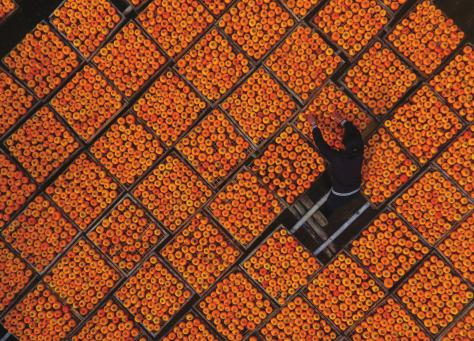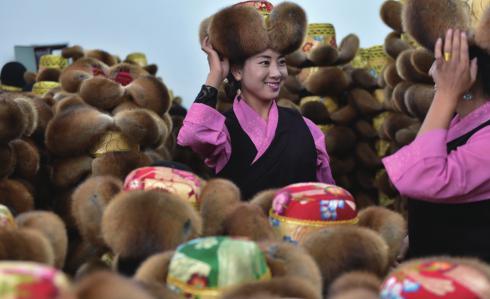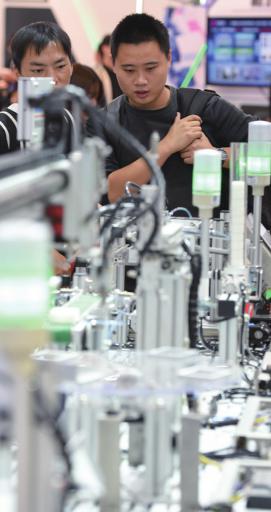Racing Against Time
2018-10-31
Staff members try to open up a new road for disaster relief on a high meadow in Jomda, Qamdo County, southwest Chinas Tibet Autonomous Region, on October 14. A new road was built to transport disaster relief supplies to Bolo Township in Jomda after it was struck by a landslide on the morning of October 16. Spanning 8 km at an altitude of over 4,000 meters, the new road enables vehicles with large quantities of relief supplies to enter the disaster-hit township.
Illegal Vaccine
On October 16, Chinese authorities handed out penalties totaling more than 9.1 billion yuan ($1.32 billion) to a company for the illegal production of a human rabies vaccine.
Changchun Changsheng Life Sciences Ltd. violated Chinas laws and regulations on drug management and production, according to an administrative penalty decision made by national and local drug authorities.
Violations included blending different batches of vaccine fl uid, falsifying dates of production and using expired fl uid to produce some of the batches. The National Medical Products Administration annulled the rabies vaccine approval document and certifi cates for related products from the company and imposed a fi ne of 12.03 million yuan($1.73 million).
The Jilin Food and Drug Administration revoked the companys pharmaceutical production license, confi scated the illegally produced vaccines and took control of the companys capital of 1.89 billion yuan ($273.149 million). A fi ne of 7.21 billion yuan ($1.042 billion) was also imposed.
This hefty fi ne was three times the total value of the defective vaccines produced and sold by the company.
Individuals directly responsible for the violations will be banned from carrying out drug manufactur- ing and operating activities, and those suspected of committing crimes will face criminal charges.
Trade Fair in Guangzhou
Chinas largest trade fair opened on October 15, in Guangzhou, capital of south Chinas Guangdong Province. Held every spring and autumn, the China Import and Export Fair, also known as the Canton Fair, is seen as a barometer of Chinas foreign trade. This year it attracted more importoriented companies.
Xu Bing, the fairs spokesperson, said imports are under the spotlight this year as the country seeks to widen its domestic market.
The fair features an exhibition area for imports with 636 companies, 19 more than the previous session. Vendors came from 34 countries and regions to exhibit their products at 1,000 booths.
The number of fi rms from countries and regions along the Belt and Road make up around 60 percent of the total participants at the exhibition.
Foreign trade rose 9.9 percent year on year to 22.28 trillion yuan($3.2 trillion) from January to September, according to the General Administration of Customs.
More than 25,580 fi rms, both domestic and international, will attend the fair. Its fi rst phase ran from October 15 to 19, featuring products such as electronics, home appliances, and mechanical equipment.
The second phase will run from October 23 to 27 and the third phase will start on October 31 and end on November 4.
Veterans Welfare
Chinas Ministry of Veterans Affairs has fi nished drafting a law on veterans welfare and is sending the document to relevant departments for consultation, the ministry said on October 16.
According to the ministry, it will send the draft law to the central and state organs, provincial-level governments and relevant military units to solicit opinions and feedback. The draft law proposes systematic regulation changes regarding employment, job training and supporting measures of veterans. It was also noted that retired soldiers who fought in wars will receive preferential treatment.
According to the ministry, profi les have been created to better support the veterans. The ministry said it will publish the draft law to solicit public opinions in due course.
Education Against Internet Fraud
A new educational program was launched in Beijing on October 16,to help senior citizens avoid falling victim to Internet fraud.
The program, initiated by Chinas Internet giant Tencent, operates under guidance from the Supreme Peoples Procuratorate, the Ministry of Public Security(MPS) and the offi ce of the National Working Commission on Aging. It will provide a series of online lessons, video clips, and articles on how to avoid common Internet frauds and scams. A report jointly released by Tencent and People.cn in June showed that 37 percent of senior netizens had been the target of Internet fraud.
China has been strengthening its forces for combating telecom and Internet fraud in recent years. In 2017 alone, Chinese police dealt with over 78,000 telecom and online scams.
Improvement of Biodiversity
The State Council, Chinas cabinet, has released a guideline to improve aquatic life protection and ecological rehabilitation in the Yangtze River.
The longest river in China, it has been damaged by human activities including dam building, water pollution and over-fi shing. The General Offi ce of the State Council said this has resulted in deteriorating biodiversity and rectifying the issue will be an arduous task. A fi shing ban on major waters, an increase in conservation areas and more protected habitats along the river are all goals to be achieved by 2020.
The guideline also said that as these improvements are made, aquatic life should witness a marked improvement.
It added that the deteriorating water environment and biodiversity should be curbed.
According to the document, by 2035, noticeable improvements should have been made in the rivers environment, with habitats of aquatic life being fully protected, the number of aquatic species seeing marked growth and the ecological functions of the waters being effectively rehabilitated. The protection of aquatic life will be included in the system for evaluating the work of local governments along the Yangtze River.
Harvesting Joy
A villager dries persimmons in Jiahui Town of Gongcheng Yao Autonomous County, south Chinas Guangxi Zhuang Autonomous Region, on October 17.
Pure School Atmosphere
On October 12, Chinas Ministry of Education (MOE) warned middle schools, primary schools and kindergartens nationwide against engaging in any form of commercial advertisements or activities.
The warning came after a recent incident in the city of Heze, east Chinas Shandong Province, where students at a local primary school were handed yellow caps and Young Pioneers red scarves with advertisements of a local shopping mall printed on them at an open activity on traffi c safety.
In its statement, the ministry said that the incident was “of a very bad nature,” and asked local authorities to draw lessons from it and take measures to prevent such advertisements and activities from entering schools and kindergartens.
The MOE called on local education departments to carry out a complete examination across schools and kindergartens, to check if there are any advertisements on students textbooks, stationery, school buses or other objects. They specifi cally highlighted the red scarves, which are worn by Chinese Young Pioneers aged between 6 and 14.
They also advised the departments to set up systems to record and examine activities which allow organizations to go into schools and reduce those that are not related to educational functions, the statement read.
Spectacular Scene
A tourist poses for photos at the Hukou Waterfall on the Yellow River in Yichuan County, northwest Chinas Shaanxi Province, on October 17. Due to heavy rainfall at the upper reaches of the Yellow River, the water volume of Hukou Waterfall recently surged.
Private Investment
The Chinese Governments intensifi ed efforts to encourage the private sectors participation in infrastructure investment for healthy economic growth are yielding results.
By the end of September, over 1,200 local infrastructure projects worth at least 2.5 trillion yuan($362 billion) had been promoted among private companies, the National Development and Reform Commission, Chinas economic planning agency, said.
The fi rms reportedly have shown interest in 150 projects worth at least 250 billion yuan ($36 billion).
At the same time, they signed eight airport construction agreements with investment totaling nearly 50 billion yuan ($7.2 billion).
Infrastructure schemes comprise energy and transportation projects, highways, garbage disposal facilities and reservoirs.
The private sector accounts for more than 60 percent of Chinas total fi xed assets investment. It rose 8.8 percent year on year in the fi rst seven months of this year.
Bridge Without Borders
The main segment of the Chinese part of the fi rst China-Russia cross-border railway bridge over the Heilongjiang River, known as the Amur River in Russia, is completed on October 13.
CPI and PPI
The consumer price index (CPI), a main gauge of infl ation, rose 2.5 percent year on year in China in September, compared with 2.3 percent for the previous month, the National Bureau of Statistics(NBS) said on October 16. It also announced that the producer price index (PPI), which measures costs of goods at the factory gate, rose 3.6 percent year on year in the same period, slowing from the 4.1-percent increase in August.
The CPI uptick was driven by a fast increase in non-food prices, which rose 2.2 percent year on year, contributing to a 1.78-percentagepoint increase in the overall CPI increase, the NBS said.
On a month-on-month basis, the CPI increased 0.7 percent from August, as food prices rose 2.4 percent.
China is aiming to keep annual CPI growth at around 3 percent this year, the same target as 2017.
The average year-on-year CPI growth for the fi rst nine months stood at 2.1 percent, compared with 2 percent for the fi rst eight months.
NBS statistician Sheng Guoqing said the carryover effect contributed 1.9 percentage points to the 3.6-percent year-on-year PPI growth, while new factors contributed 1.7 percentage points.
On a monthly basis, the PPI increased 0.6 percent in September, picking up from 0.4 percent in August.
Simpler Forex Rules
The State Administration of Foreign Exchange (SAFE) on October 16 announced the abolition of 17 regulations on forex management to promote trade and investment facilitation.
As a part of the governments reform to improve regulations and services, clearing the outdated regulations will help market entities better understand the countrys forex policies, SAFE said in a statement.
The abolished regulations used to center on aspects including import forex payment, trade in service and foreign debt, as well as the forex management for fi nancial institutions, companies and individuals.
The administration has also scrapped the requirements on the quota and account validity for frontend expenses of foreign direct investment in two regulations to make direct investment into China easier.
In the future, SAFE will continue to clear outdated laws and regulations for trade and investment facilitation, the statement said.
Trade Growth
Chinas exports went up 6.5 percent year on year to 11.86 trillion yuan($1.72 trillion), while imports soared 14.1 percent year on year to 10.42 trillion yuan ($1.5 trillion) in the fi rst three quarters of 2018, General Administration of Customs (GAC) data showed on October 12.
The trade surplus was narrowed by 28.3 percent to 1.44 trillion yuan($208 billion) for the JanuarySeptember period.
Exports of electromechanical products increased by 7.8 percent to 6.91 trillion yuan ($995 billion), taking up 58.3 percent of Chinas total export value, GAC spokesperson Li Kuiwen said.
It showed the green development of foreign trade, reducing the exports of energy-intensive, polluting and resource-consuming products by 7.6 percent, Li said.
During the same period, China imported 336 million tons of crude oil, 64.78 million tons of natural gas and 24.59 million tons of refi ned oil.
The countrys overall import costs grew by 4.2 percent. Major bulk commodities, including crude oil, natural gas and copper, saw increases both in volume and price.
Li attributed the increase in imports to the governments favorable measures, including tax cuts, policies to optimize the business environment and tariff reductions.
Trade between China and other Belt and Road countries grew 3.3 percentage points faster than the growth rate of Chinas overall foreign trade.
To improve the business envi- ronment and facilitate cross-border trade at customs, China will further reduce customs charges, enhance the effi ciency of customs supervision and accelerate customs clearance, Li said.
If the Hat Fits...
Young women try on Tibetan hats at a factory in Zhanang County, southwest Chinas Tibet Autonomous Region, on October 11. Making and marketing these hats have become a means of income generation for some poverty-stricken families in the county.
Stock Connect Rules
The China Securities Regulatory Commission (CSRC) on October 12 issued trial rules on depositary receipts in the Shanghai-London Stock Connect program after soliciting public comments for more than a month.
The rules mark an important step for the program, which will enable stocks listed in Shanghai and London to be traded in each others market by issuing depositary receipts.
The CSRC revised some items in the previous version, including the restricted redemption period for Chinese companies issuing global depositary receipts (GDRs) and the rights issue of overseas companies after their China depositary receipts(CDRs) offering.
Effective upon release, the rules detail the procedures and requirements for issuing CDRs and GDRs, such as the approval system, continued regulation and law enforcement.
Expo Service
The Shanghai Customs has rolled out a spate of measures to ease the inspection process for people and exhibits related to the China International Import Expo.
The measures include setting up 38 VIP channels and 92 channels specially dedicated to the exhibits of the expo in airports and ports across the city, the customs authorities said on October 19.
The authorities also said they will simplify the documentation needed for pets or bio-medicines brought by representatives to the expo, to be held in Shanghai on November 5-10.
They have also developed a big data platform for the event, which can improve the declaration speed by allowing for paperless applica- tions and automatic declaration.“We are well prepared for Chinas fi rst import expo,” said Huang Yuming, deputy head of the Shanghai Customs.
Automatic Reaction
A visitor watches an automatic production line at the World Intelligent Manufacturing Summit in Nanjing, east Chinas Jiangsu Province, on October 11.
Robotic Parking Lot
The fi rst robotic parking facility in Israel, built by a Chinese company, was inaugurated at a train station in Kfar Saba City on October 14.
The facility, which lifts parked cars to the upper fl oors, was built by the Israeli branch of Tangshan Parking Equipment Co. (TOPP) in cooperation with Kfar Saba.
The facility consists of a marketing display and 12 parking spaces. The cost of setting up 500 parking spaces in a regular fi ve- or six-fl oor parking lot amounts to about $18 million, while TOPPs system costs about $6.9 million.
TOPP, a leading company in the fi eld of robotic parking lots, has established about 750,000 parking spaces in China. It has also completed projects in Russia, Japan, Colombia and Australia.
